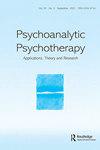Trainee psychologists’ experiences of learning and conducting psychodynamic therapy via telepsychology
IF 1.2
Q1 PSYCHOLOGY, PSYCHOANALYSIS
引用次数: 1
Abstract
Despite extensive research on telepsychology, less attention has been devoted to psychodynamic therapy (PDT), especially trainee psychologists’ experience of learning and conducting online PDT. Using inductive thematic analysis, this study explored the experiences of student psychologists learning and conducting PDT via video-based web platforms. Semi-structured interviews were conducted with 10 Australian trainee psychologists, all completing the psychodynamic component of their clinical psychology training. Interviews addressed participants’ experiences of online PDT learning and psychotherapy practice, generating five main themes: (1) technological barriers and their impacts, (2) overcoming telepsychology limitations through awareness and adaptation, (3) benefits of telepsychology, (4) effectiveness of psychodynamic telepsychology, and (5) experience of online psychotherapy learning. Participants reported that the paucity of sensory information, client resistance, distraction, problems maintaining therapy boundaries, supervisor opposition, and technological limitations made online PDT difficult to conduct and less effective than in-person treatment. However, some participants noted that the anxiety of commencing PDT delivery was reduced online, and that the ‘layer of separation’ assisted countertransference management. Notwithstanding its inherent limitations, online PDT was perceived to be relatively effective, but this requires specific training in adapting traditional psychodynamic techniques. Furthermore, PDT may be effectively learned online, but is an inferior alternative to in-person training.受训心理学家通过远程心理学学习和进行心理动力治疗的经验
尽管对远程心理学进行了广泛的研究,但对心理动力疗法(PDT)的关注较少,尤其是实习心理学家学习和进行在线PDT的经验。本研究采用归纳主题分析法,探讨了学生心理学家通过视频网络平台学习和进行PDT的经验。对10名澳大利亚实习心理学家进行了半结构化访谈,他们都完成了临床心理学培训的心理动力学部分。访谈涉及参与者的在线PDT学习和心理治疗实践体验,产生了五个主要主题:(1)技术障碍及其影响,(2)通过意识和适应克服远程心理学的局限性,(3)远程心理学的好处,(4)心理动力远程心理学的有效性,以及(5)在线心理治疗学习体验。参与者报告称,感官信息的缺乏、客户的抗拒、注意力分散、维持治疗界限的问题、主管的反对和技术限制,使得在线PDT难以进行,也不如亲自治疗有效。然而,一些参与者指出,开始PDT递送的焦虑在网上减少了,“分离层”有助于反移情管理。尽管存在固有的局限性,但在线PDT被认为是相对有效的,但这需要在适应传统心理动力学技术方面进行专门的培训。此外,PDT可以在网上有效地学习,但与面对面培训相比,它是一种较差的选择。
本文章由计算机程序翻译,如有差异,请以英文原文为准。
求助全文
约1分钟内获得全文
求助全文
来源期刊

Psychoanalytic Psychotherapy
PSYCHOLOGY, PSYCHOANALYSIS-
CiteScore
1.30
自引率
37.50%
发文量
22
期刊介绍:
Psychoanalytic Psychotherapy publishes original contributions on the application, development and evaluation of psychoanalytic ideas and therapeutic interventions in the public health sector and other related applied settings. The Journal aims to promote theoretical and applied developments that are underpinned by a psychoanalytic understanding of the mind. Its aims are consonant with those of the Association for Psychoanalytic Psychotherapy in the NHS (APP in the NHS) in promoting applied psychoanalytic work and thinking in the health care system, across the whole age range.
 求助内容:
求助内容: 应助结果提醒方式:
应助结果提醒方式:


